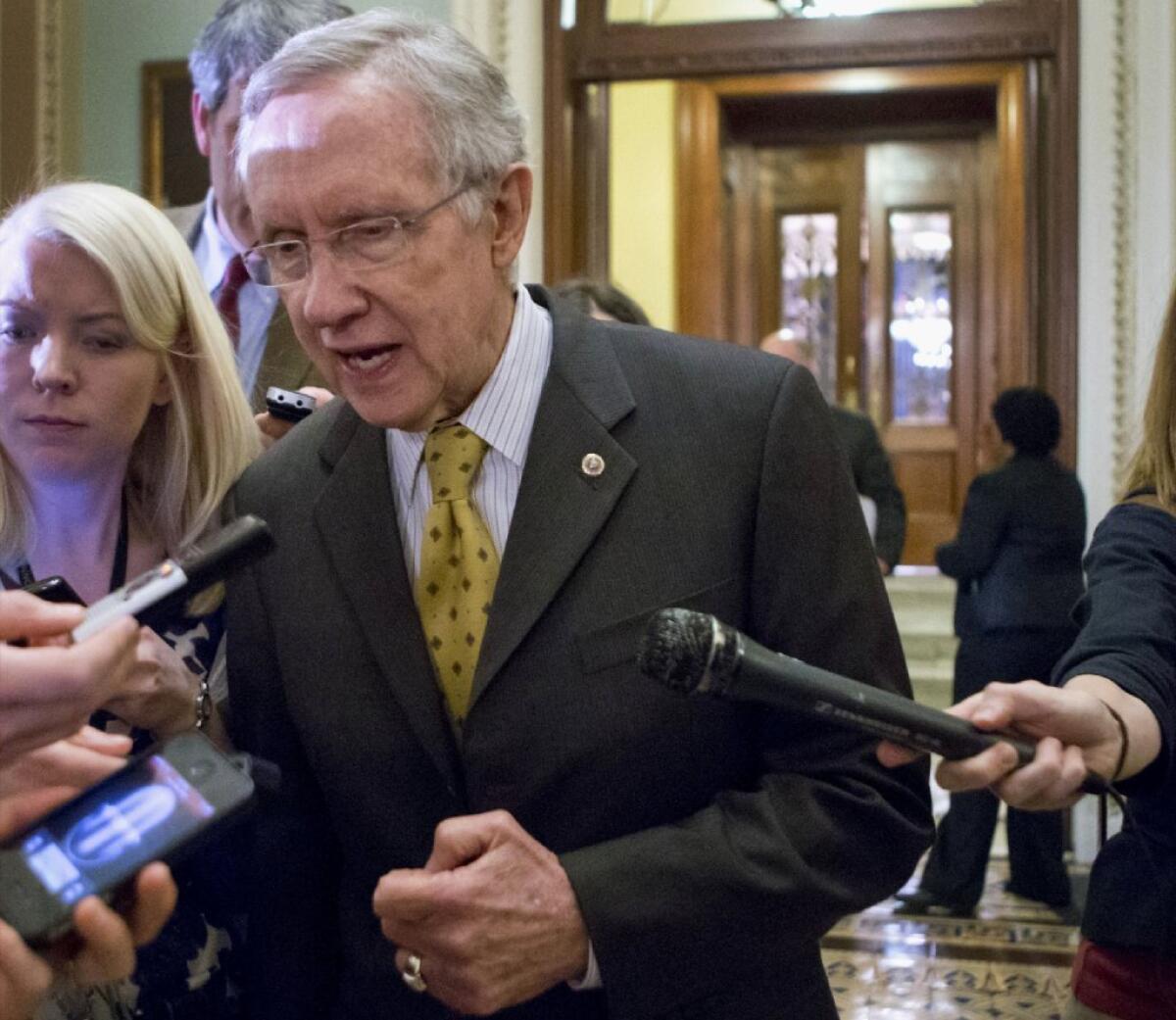House GOP picks a curious fight with Senate Democrats

- Share via
In my zeal Friday to praise House Republicans for dropping their self-destructive stance against raising the debt limit, I neglected to point out that they couldn’t bring themselves to do so without picking a new fight with Democrats.
It’s as if the House GOP can’t stop itself from tilting at windmills.
Republican leaders announced Friday that their membership had agreed to support a three-month suspension of the debt limit, effectively shifting their fight for deeper spending cuts off the debt-limit bill to either (or both) of two looming spending bills: one to adjust more than $100 billion in across-the-board spending cuts due to take effect March 1, and another to provide funding for the federal government after its temporary appropriations run out March 27.
It was a savvy move. Because it doesn’t actually raise the debt limit, the GOP can continue to threaten to block future increases unless Democrats agree to deep spending cuts. More important, it shifts the fight from the debt limit to spending bills, which is where it belongs.
Yet Republicans couldn’t just make a tactical retreat. The temporary debt-limit waiver bill unveiled Monday includes a provision that would withhold the pay of lawmakers if their chamber fails to pass a budget resolution by April 15, as required by the 1974 Congressional Budget and Impoundment Control Act. This little dagger is aimed squarely at Senate Democrats in general and their leader, Harry Reid of Nevada, in particular. With Reid at the helm, the Senate hasn’t passed a budget resolution since 2009.
The bill would escrow lawmakers’ paychecks, rather than canceling them, until either their chamber passes a budget resolution or the 113th Congress ends two years from now. The escrow provision was designed to avoid violating the 27th Amendment, which states that Congress cannot pass a law “varying the compensation” of its members unless it takes effect in a subsequent Congress. But it’s hard to argue with a straight face that withholding lawmakers’ pay, potentially in non-interest-bearing accounts, doesn’t amount to varying their compensation.
Senate Democrats deserve scorn aplenty for not passing a budget resolution. Even though it’s not a constitutional requirement, it’s an important exercise in setting priorities. But it’s not necessarily a fruitful exercise. It’s hard to imagine House Republicans and Senate Democrats agreeing on a budget; the former want to close the budget gap entirely through cuts in domestic programs and entitlements, while the latter want to do it mainly through tax hikes and reductions in the defense budget.
More important, the budget resolution doesn’t have the force of law. And even if the two chambers find a way to agree on a resolution, it has limited power to bind Congress.
Republicans and Democrats already have plenty of opportunities each year to fight substantively over spending, most notably the annual appropriations bills that finance the day-to-day operations of government. Why, then, does the House GOP care so deeply about having a budget resolution? Do lawmakers really need more brinkmanship?
It’s worth remembering that the 2011 debt-ceiling deal set into law the spending limits for fiscal 2012 and 2013. That made the absence of annual budget resolutions moot. Granted, the Senate ignored the sweeping changes to federal benefit programs that House Republicans called for in the reports the House Budget Committee issued, but those reports don’t have the force of law either. If the House really wanted to start the ball rolling on turning Medicaid into block grants, changing Medicare into a premium subsidy program or shoring up Social Security for the long term, it could start the hard work of introducing bills, holding hearings on them, perfecting them with amendments and passing them. But it hasn’t.
Persuading the Senate to pass a budget resolution won’t bring the two sides any closer to enacting a plan to solve Washington’s long-term fiscal problems. And if the Senate produces a budget, chances are the House GOP will wonder why it was so eager to see it.
On NBC’s “Meet the Press” on Sunday, a top Senate Democrat, Chuck Schumer of New York, said that his colleagues consider a budget resolution “a great opportunity for us” to push for tax reform that (wait for it) raises revenues. “We’re going to do a budget this year and it’s going to have revenues in it,” Schumer said, “and our Republican colleagues better get used to that fact.”
ALSO:
L.A. imagined: The city that isn’t
Letters: Lance Armstrong the cheater
Follow Jon Healey on Twitter @jcahealey
More to Read
A cure for the common opinion
Get thought-provoking perspectives with our weekly newsletter.
You may occasionally receive promotional content from the Los Angeles Times.











